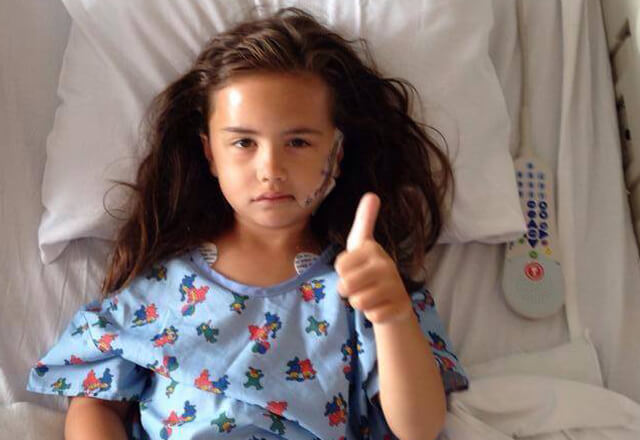Demi: The Beauty of a Smile

On the night of September 8th 2011, Demi Friedel enjoyed a 5th birthday celebration with her parents, Gina and Rick, and her brother, Logan. Her larger-than-life personality was a bit muted that night, and all she wanted to do was sleep. Four days later her life began to take a path that neither she nor her family could have ever prepared for.
Demi began having trouble seeing, and she could not stand or walk on her own. Demi's parents brought her to her pediatrician and within hours, doctors at the Johns Hopkins Children's Center admitted Demi to the Pediatric Intensive Care Unit (PICU).
After hours of testing, doctors at the Johns Hopkins Children's Center diagnosed Demi with a brain bleed caused by a malformed blood vessel in her brain stem - the worst place to have a brain bleed. Due to the risks involved, pediatric neurosurgeons recommended watchful waiting-- an operation would be a choice of last resort--hoping that her body would resolve the bleed on its own. Demi underwent several brain scans to monitor the bleed, and initially her doctors thought the bleed had stopped. For four days, Demi's friends and family prayed and hoped for this best-case scenario, constantly watching for signs of improvement.
Unfortunately, Demi's symptoms continued to worsen. A swelling in her brain caused increasingly higher pressure inside her skull, causing Demi to lose alertness and to spend less and less time awake. After four tough days in the PICU and multiple seizures, doctors decided to operate to remove the blood that had built up on her brain stem.
Pediatric neurosurgeon George Jallo performed the three and a half hour surgery, during which he discovered only old blood, indicating that the bleeding in Demi's brain had stopped. She showed signs of improvement within hours after surgery, and her vivacious, goofy personality returned. Her post-surgery symptoms included muscle weakness, limited motor skills on her left side, and loss of movement on the right side of her face, including her right eye.
Demi underwent extensive therapy to regain her strength and the ability to walk. Throughout this process, Demi never questioned why she couldn't use her hand or walk the way she used to; she remained optimistic and made the best of every situation. She always wanted to tell jokes and make people laugh; bringing joy to everyone she met throughout her journey.
Today Demi is doing remarkably well. She still suffers residual motor skill issues in her left hand, her balance, and the right side of her face. In August of 2014, Demi underwent the first of a two part surgery to bring back her full smile, where doctors took a nerve from her lower leg and attached to a nerve that controls muscle movement, including smiling and facial expressions on the left side of her face. In June 2015, doctors at the Johns Hopkins Children's Center will take a muscle from her inner thigh and transfer on to her right cheek, connecting it to the nerve grafted there earlier. The hope is that the treatment will allow Demi to smile fully within three months of the second operation.
Today, Demi enjoys playing soccer, doing crafts, and singing. She also plays an integral role in helping her parents plan their annual fundraiser to benefit the Johns Hopkins Children's Center, among other deserving non-profits.
"Johns Hopkins Children's Center is part of us, and they always will be," says dad, Rick, "They're part of our family. They gave us our little girl back."

